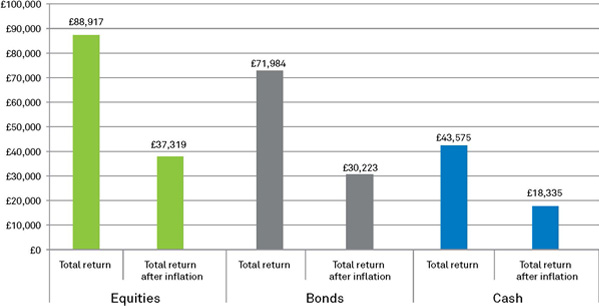(This is the first in a series about the biggest lies people in financial services tell us to get hold of our money. I hope these will be useful to readers. Not all will be relevant to everyone, but perhaps they could be useful to your family or friends.)
If it were the case that cash (money held in a bank savings account) usually outperformed shares (either shares held directly by savers or held by unit trusts and pension funds) then most of us would be much better off leaving our savings in a bank deposit account�rather than investing in stock markets, unit trusts, bonds, ETFs, OEICs or whatever. But this would also mean that most of Britain�s 28,000 supposedly �independent� financial advisers (IFAs) and many tens of thousands of bank �financial advisers� (salespeople) plus most personal finance journalists would be out of a job. So, those who want us to hand our money over to them are constantly repeating the mantra that �over the longer term, shares outperform cash�.
This is a typical chart produced by an investment company (in this case Blackrock) supposedly showing the returns on �10,000 invested in shares, bonds and cash over a 25-year period
Well, it looks like shares are the place to be. There is only one small problem – it�s not true!
I have always believed the �shares outperform cash� story till I read the excellent free book Monkey with a Pin.�The data most journalists and financial advisers use to justify claiming �shares outperform cash� is usually the yearly Barclays Equity Gilt Study. We have now learnt that anything with the crooked Barclays name attached should be treated with the utmost caution. When comparing the returns on shares and cash, Barclays don�t look at the interest we would get from 2- and 3-year higher interest bank and building society accounts. Instead Barclays use UK Government 5 Year Treasury Bills as what they call �cash�.
These Treasury Bills are not available to ordinary savers like you and me, so to use them as a proxy for �cash� is ridiculous. Moreover, the interest paid by 2-and 3-year higher interest deposit accounts is almost always much higher than Government Treasury Bills. At the moment, UK Government 5-year Treasury Bills pay around 1.45%. Even with savers’ interest rates at rock bottom due to our useless government’s Funding For Lending scheme, you can get 1.8% on a 1-year savings account, over 2% on 2-years and over 3% on 5 years. So a 5-year savings account is paying more than twice the interest of a 5-year Treasury Bill.
If Barclays used the average interest paid even by 2- and 3-year higher interest bank accounts, then for 80 of the last 100 years, cash would have easily outperformed shares. There was just a brief period of 20 years (the 1980s and 1990s) when shares outperformed cash. This was because of a flood of baby-boomer savings into unit trusts and pension funds. As the baby-boomers retire and their money gets taken out of shares and pension funds, we can expect falls in share prices. And, of course, Barclays don�t take account of the �150m a day we savers who do put money into shares�pay in fees, commissions and many other charges to people like Barclays, IFAs, unit trust bosses and pension fund managers.
Taking the chart from Blackrock (above), you should at least double the return from cash to take account of what we ordinary savers would get from a reasonably safe 2-year or 3-year bank deposit account. If you do that, you’ll see that cash and shares are pretty evenly matched. The only difference is that if we keep our money in cash, all the parasites in the financial services industry can’t keep creaming off fees and commissions and our personal finance journalists would have little to write about.
So, if�a bank or financial adviser or personal finance journalist ever claims that �over the longer term shares outperform cash� either they are knowingly lying to you to earn commissions by selling some investment that will�make them richer�than it will�make you or else they are so stupid that they don�t even know how the thoroughly misleading �shares outperform cash� calculation is done.
You have been warned.















Leave a Reply